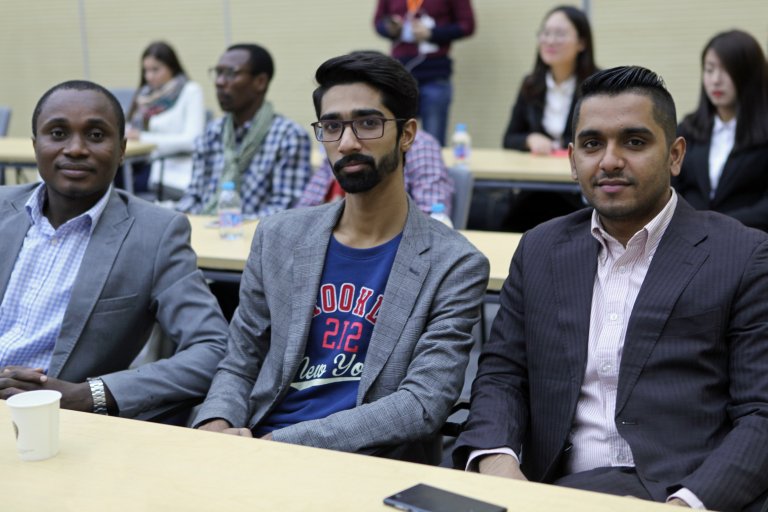
The International Project Management program in Shandong University is a real-time case for the Belt and Road Initiative to go to education
China's ambitious Belt and Road Initiative is seeking to rejuvenate economic and cultural ties across dozens of countries, but will there be enough management talent to implement this far-reaching plan? One renowned university in eastern China may have some solutions.
Shandong University's International Master of Project Management program has been offering scholarships to foreign students for the past couple of years and its popularity has been steadily growing.
Despite its success today, the program faced some challenges and difficulties in the beginning.
New visions for a grand initiative
Professor Ding Ronggui, Ph.D. supervisor for the School of Management of Shandong University, started the International Master of Project Management program in 2015. He still remembers clearly how nervous his whole team was when waiting for the first group of students to arrive.
“The first year only eight people applied for our courses and five of them actually showed up at the opening day. A professor in our team, Sun Tao, went to the classroom very early that day, worrying that there would be no one.” Ding said, “You know, people can still skip even if they have registered.”
“But in 2016, the number of applicants had risen to over 100 and 33 enrolled. 26 of them actually made it.” Ding continued, “And things keeps looking brighter this year. The number has neared 200 by now and the application process is not finished yet, with applicants from over 20 countries, including the US and UK.
Ding's excitement is not groundless. Shandong University is among the 40 universities to be registered in the Project Management Institute (PMI) from America, a hugely influential project management organisation, and, despite lacking the research funds and reputation of top universities like Tsinghua, Ding says Shandong is now number one in the area, with a focus on students from countries along the Belt and Road.
Local projects, local talent
“As the world's largest developing country, China naturally attracts the densest investment and projects. Successful as well as failed experiences in project management have been accumulated,” Professor Ding says, adding that, “It is reasonable for China to share these experiences with other developing countries.”
To promote the realisation of Belt and Road Initiative on education, the Chinese government has offered scholarships to 10,000 students per year from these countries. That's why Ding's students have various scholarships from the Ministries of Education and Commerce. But what's special for Ding's program is that it also received scholarships from Chinese enterprises.
“Chinese companies are eager to expand overseas and they need local talents who are familiar with both China and destination countries,” said Ding. “Such kind of talents are rare. Therefore, they are more than happy to have these students as interns in their second year of study or even be formal employees in the future.”
The intern project covers almost all of China's major state-owned enterprises in infrastructure, such as China International Engineering Consulting Company, Tenth Construction company of China National Petroleum Corporation, China Railway Engineering Corporation, China Railway Construction Corporation and Power China Nuclear Engineering Corporation.
“Connect China with my country”
Noor Wasif, international student in Shandong University, an international student from Pakistan, joined the program in September 2016. He talked about why he chose to apply for the project management degree at Shandong University and how he feels about it now.
“I preferred to become a project manager after I finished my bachelor's degree in civil engineering and worked for one year in China. I checked the PMI website and I discovered that Shandong University is listed among the universities registered.” Wasif said, “The professors are really good. They come from different countries, Australia, Germany and Italy and have much experience. I thought I could really learn something. That's why I chose to come here at the first place.”
“Now it is almost one year after I came here, things turned out even better. The courses are beyond my expectation. The campus environment is quiet and good for studying, unlike some campuses in the area with large population. I have made many Chinese friends. Everything looks just good.”
When asked about his plans after graduating from Shandong University, Wasif said he would prefer to work in Chinese companies who have projects in his homeland, Pakistan.
“China and Pakistan have very good relations and Chinese companies have many projects in Pakistan. So I will find a job in one of such companies. You know, Chinese companies can have many problems in Pakistan, such as language, communication and religion issues. I can help them dealing with the issues. I am familiar with China since I have stay here for six years and I certainly know Pakistan. I can be a bridge connecting China and my own country.”
Written by: Chi Dehua
Edited by: Xie Tingting
Source: Gbtimes